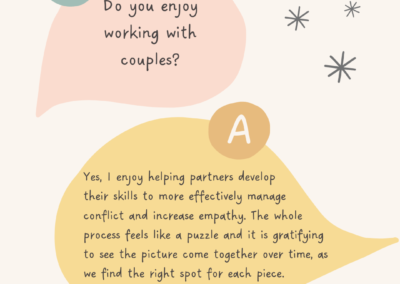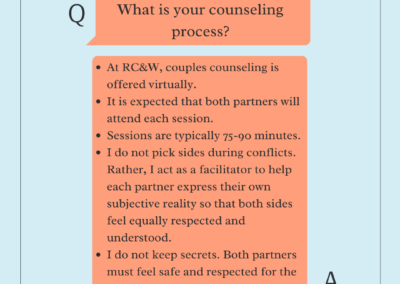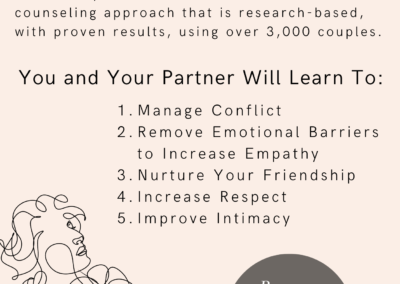The Right Couples Counselor
Whether you are pursuing marriage counseling, couples counseling, or even premarital counseling, you have the right to–and you definitely should–shop around to find the right fit of counselor for you and your partner. You may meet one counselor in which either you or your partner feel comfortable with. However, if both of you do not feel safe and connected to the person in front of you, couples counseling will not work.
Questions to Ask Your Couples Counselor
You may ask any of the following questions to gain a deeper understanding of couples therapy and what you can expect moving forward.
1. How much does Couples Counseling cost?
You may visit the Frequently Asked Questions (FAQ) page to see the most updated cost of services available to you.
2. Do You Enjoy Working with Couples?
One would assume that a counselor who works with couples would like working with couples. However, in my experience, this is not always the case. Some counselors simply just find themselves in the role. When you are pursuing couples counseling, or any type of counseling for that matter, it helps to have a counselor who is passionate about the work they do. Therefore, I recommend asking what the counselor is passionate about.
Personally, I enjoy helping partners develop their skills to more effectively manage conflict and increase empathy. The whole process feels like a puzzle and it is gratifying to see the picture come together over time, as we find the right spot for each missing piece.
3. What is Your Counseling Process?
Couples counseling is very different from individual counseling. Each therapist will have their own set of rules and expectations.
At Retreat Counseling & Wellness, couples counseling is offered both virtually, from the comfort of your own home, and in-person located at our Cabot office. It is expected that both partners will attend each session, unless planned otherwise. Each session is typically 90 minutes in length, give or take 10 minutes.
As your couples counselor, it is important for me to say, I do not pick sides during conflicts. Rather, I act as a facilitator to help each partner express their own subjective reality so that both sides feel equally respected and understood.
To honor both partners’ realities, one of the more important rules I have when providing couples counseling is, I do not keep secrets. The reason I choose not to keep secrets is to maintain appropriate boundaries between partners. Both partners must feel safe and respected for the therapeutic process to work.
4. What Therapeutic Approach Do You Use?
There is more than one way to approach couples work. Ideally, counselors who provide professional services to couples have completed additional training in a theory or method that has been supported by empirical evidence (research-based).
In couples counseling, I use The Gottman Method of Couples Therapy. The Gottman Method was developed by Dr. John Gottman. He began studying couples in the 1970s and he and his wife, Dr. Julie Gottman, continue to conduct research on couples to this day. They describe The Gottman Method as a “nuts-and-bolts” aproach to improving relationships. It is designed to teach partners new skills to help manage conflict while simultaneously deepening their friendship and improving intimacy. In the first three sessions, the couple undergoes a thorough assessment process to identify their strengths and vulnerabilities, which in turn are used to develop an agreed-upon treatment plan.
5. What Do You Think Our Problem Is?
Many times couples pursue counseling thinking one thing to be their problem when in actual reality, their perceived “problem” is a symptom from a more deeply rooted problem. This is why a thorough assessment is important in couples work.
Read more about the typical assessment process when I work with couples here.
Most often, when we look at couples’ problems using The Gottman Method, we find that couples struggle to create dialogue surrounding perpetual problems. Every relationship deals with their own unsolvable, perpetual problems. With a detailed assessment, the counselor and couple client can determine exactly what area of the relationship is hurting and develop new skills to improve interactions.
Find a more detailed answer to this question here.




